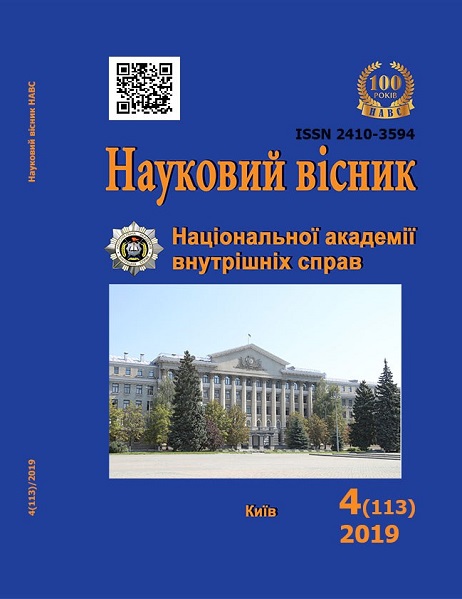Scientific Premises for the Formation and Development of Criminalistic Doctrine on the Collection, Examination and use of Evidence in Criminal Proceedings
Abstract
The purpose of the article is to analyze forensic problems of theoretical and practical nature, which serve as scientific premises for the formation and development of criminalistic doctrine on the collection, examination and use of evidence in criminal proceedings. Methodology. A system-structural and formal-logical analysis was applied to determine forensic issues, which are the premises for the formation and development of the doctrine, the method of forecasting – to determine the approximate ways of solving such problems. Scientific novelty. On the basis of the analysis of the basic directions of scientific search in criminalistics, the author has identified a number of common scientific problems of forensic science, for which criminalistic doctrine on the collection, examination and use of evidence in criminal proceedings can indirectly serve as a solution within the scope of its subject of research, as well as a number of own scientific problems of this sphere of knowledge. The ways of solving the described problems through the formation and development of the proposed doctrine are given. Conclusions. Scientific premises for the formation and development of the abovementioned doctrine are a number of problems of theoretical and practical nature, for the solution of which it serves. Common forensic problems that can be solved by the doctrine are: the problem of the impact of scientific and technological progress on criminal activity and on the activities of detection, investigation and counteraction to crime; the problem of compliance of scientific forensic recommendations with the requirements of the current legislation; the problem of conformity of theoretical forensic developments with the requirements of practice and generalization of practical experience of applying forensic recommendations; the problem of criminalistics integrating the achievements of other fields of knowledge; the problem of defining the criminalistics system. The own problems of the doctrine include: the presence of a large number of different scientific works in this field; lack of theoretical substantiation of the doctrine; the need to formulate specific forensic views on evidence and proving. The formation and further development of proposed criminalistic doctrine should help to solve the problems described.
Keywords: criminalistics; private criminalistic doctrine; scientific prmises; scientific and technological progress; practice.
Downloads
References
Белкин Р. С. Курс криминалистики : учеб. пособие : у 3 т. 3-е изд., доп. Т. 1. М. : Юнити-Дана, 2001. 837 c.
Белкин Р. С. Общая теория криминалистики в условиях научно-технической революции. М. : Норма. 2009. 768 с.
Chase R., LaPorte G. The Next Generation of Crime Tools and Challenges. NIJ Journal. April 2018. No. 279. URL: https://nij.gov/journals/279/Pages/next-generation-ofcrime-tools-and-challenges-3d-printing.aspx.
Deshmukh S. R., Dalvi A. S., Bhalerao T. J., Dahale A. A., Bharati R. S., Kadam C. R. Crime investigation using data mining. International Journal of Advanced Research in Computer and Communication Engineering. 2015. No. 3. Vol. 4. P. 22–25. doi: https://doi.org/10.17148/ijarcce.2015.4306.
Дулов А. В. Методологические теории криминалистики. Вестник Академии МВД Республики Беларусь. 2008. № 1 (15). С. 131–136.
Эксархопуло А. А. Криминалистическая теория: формирование и перспективы развития в условиях НТР : автореф. дис. … д-ра юрид. наук : 12.00.09. СПб., 1993. 33 с.
Комісарчук Р. Епістемологічні основи криміналістики. Jurnalul juridic national: teorie şipractică. 2018. № 2 (30). Ч. 1. С. 163–167.
Коновалова В. Е. Версия: концепция и функции в судопроизводстве. Харьков : Консум, 2000. 176 с.
Коновалова В. О. Методологія криміналістики: нова концепція. Наукові праці Національного університету «Одеська юридична академія». 2017. № 19. С. 214–219. doi: https://doi.org/10.32837/npnuola.v19i0.514.
Matheson S. DNA phenotyping: snapshot of a criminal. Cell. 2016. No. 5. Vol. 166. P. 1061–1064. doi: https://doi.org/10.1016/j.cell.2016.08.016.
Можаева И. П. Криминалистическое учение об организации расследования преступлений : учеб. пособие. Саратов, 2015. 204 с.
Салтевський М. В. Криміналістика : підручник : у 2 ч. Xарків : Консум ; Основа, 1999. Ч. 1. 416 с.
Криміналістика : підручник : у 2 т. / [В. Ю. Шепітько, В. А. Журавель, В. О. Коновалова та ін.] ; за ред. В. Ю. Шепітька. Харків : Право. 2019. Т. 1. 456 с.
Волобуєв А. Ф. Криміналістика в умовах реформування кримінального судочинства. Правовий часопис Донбасу. 2018. №. 3. С. 153–157. doi: https://doi.org/10.32366/2523-4269-2018-64-3-153-157.
Журавель В. А. Науковий пошук у криміналістиці: засоби та шляхи здійснення. Вісник Академії правових наук України. 2002. № 2 (29). С. 166–173.
Журавель В. А. Система криміналістики: традиційні підходи та новаторські пропозиції. Вісник Національної академії правових наук України. 2017. № 2 (89). С. 130–134.
Abstract views: 132 PDF Downloads: 255
- Authors reserve the right to authorship of their own work and transfer to the magazine the right of the first publication of this work under the terms of the Creative Commons Attribution License, which allows other persons to freely distribute published work with mandatory reference to authors of the original work and the first publication of an article in this magazine.
- Authors have the right to enter into separate additional agreements on non-exclusive dissemination of the work in the form in which it was published in the journal (for example, to post an article in the institution's repository or to publish as part of a monograph), provided that the link to the first publication of the work in this journal is maintained.
- The journal's policy allows and encourages the posting of articles by authors on the Internet (for example, in electronic storehouses of institutions or on personal websites), both before the submission of this manuscript to the editorial office and during its editorial processing, as this contributes to the creation of a productive scientific discussion and positively affects the efficiency and dynamics of citing the published work.




